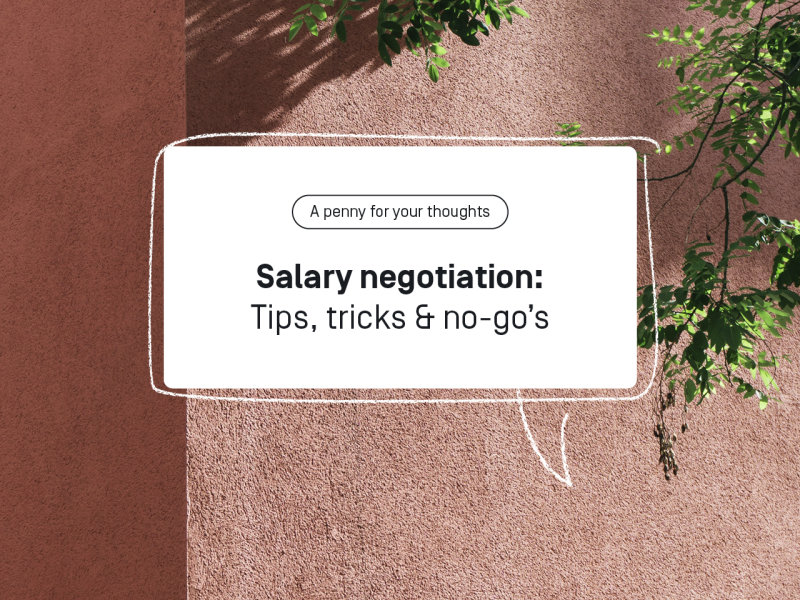How do I get the salary that I feel I deserve? Anne-Kathrin Gerstlauer provides expert coaching on the art of pay negotiations. As part of our new series ‘A penny for your thoughts’, she shares her top tips with you.
Have you ever asked yourself if you come across as arrogant when you ask for more money? Are you afraid of not getting the job if you say that the pay isn’t enough for you?
These are questions that women in particular – but not exclusively – tend to ask themselves. At the end of the day, the people who lose out are the quiet ones who do an excellent job but don’t spend the whole day telling everyone about it. Unfortunately, when it comes to negotiating pay, that’s just the way things are: the squeaky wheel gets the grease and people who make the most noise end up with the most money.
Is that fair? No, it’s not. Are there tips and tricks to help you beat this system and get the money you deserve? Yes, there are!
When it comes to negotiating pay, the most important thing is what you think you should get
But before we get down to concrete tips, wording, timing, tools and so on, it’s important to determine what you think you’re worth. After all, if you yourself don’t believe that you deserve more money, you’re not going to get it.
So let’s return to the question we asked at the outset: Do I come across as arrogant if I ask for more?

Once, when I was heading up a team, I had two applicants for roughly the same job – a woman and a man – within the space of a couple of days. She said she wasn’t willing to accept the job for anything less than €36,000. Her CV was impressive: managerial experience, innovation – all the right boxes were ticked. He asked for almost twice as much. Did I think he was arrogant? No. I thought he must really know his stuff – and that the woman was unprofessional to ask for so little money.
So what can I do to be more confident?
The 5 most important tips for your next pay negotiation
1. Know your worth.
Can you say right away what you will earn this year? Including Christmas bonus and holiday pay? No? Then work it out right now. Next step: Do you know if that figure is high or low given your position and work experience? What do other people in the same company and the same sector earn? Start talking about money – with colleagues, with friends, with people online who are in the same line of work as you. Here in Germany, we talk far too little about money. This is of no benefit to anyone – except, of course, company bosses who know only too well that, if people don’t know they could earn more money elsewhere, it’s not going to bother them. If you know what you’re worth, you should ask for more. Look at your pay negotiation as a kind of game: your boss wants to pay you as little as possible and you want to get as much as possible out of it. In most cases, I asked for between 10 and 20 percent more.
2. Know your achievements.
The next step is to write down everything you’ve achieved over the past year. What were you praised for? What are you particularly good at? This doesn’t just include measurable successes but also factors such as: Are you good at keeping a team together? Are you reliable? Take the list with you to your next pay negotiation. Name your achievements, name your price. And then... don’t say anything else. When it comes to negotiating pay, silence is your secret weapon. You don’t have to justify yourself if your boss says that the budget doesn’t stretch to what you’re asking for, that it’s been a tough year or that your demands are unfair towards the rest of the team because there will be less money left over for them.
3. Don’t make it your problem.
Even if all of that is true, it’s the company’s problem, not yours. If they want to keep you, then they’re going to have to be creative. One factor to bear in mind is that your salary doesn’t make all that much of a difference to a company, particularly large and medium-sized ones. The moaning and groaning is often just an excuse. So it’s best to keep schtum. This makes a confident impression and will force the person at the other side of the table to justify why you are NOT worth the money. In my first negotiation, my boss laughed out loud and said that what I was asking for was absurd. I didn’t respond. Then he said: “I always do that.” To which I replied: “I know.” After this, he wrote a number on a piece of paper – the exact amount that I had in mind myself. Ultimately, you have to name a figure that is so brazen that it’d make you laugh out loud yourself. If it doesn’t feel cocky, you’re not asking for enough.
4. Practice, practice and more practice.
Riding out silences, standing up for yourself, listing your achievements – all of this is easier said than done. It’s always a good idea to do a test run with friends or colleagues. And get them to ask all the difficult questions and all the misgivings and justifications they can think of – while being thoroughly disagreeable into the bargain. Because anything can happen during a pay negotiation. I have people in my coaching courses who were told by their bosses that it was their own fault that they earned so little or that they hadn’t made much progress in their career to date. These managers resort to acting unprofessional and getting personal just to push down your asking price. Unfortunately, you need to be prepared for this.
5. Know the little tricks.
Find out beforehand what is a good time to negotiate a pay rise. Is it during the staff appraisal? Is the new budget negotiated once a year anyway? Think about whether you can take on new responsibilities. This is because one of the most popular counterarguments is that you have a standard company contract or collective wage agreement. The only way around this is to have a new (pseudo-) function at the ready that will justify a raise. And if there really is nothing doing right now, make sure you at least secure a serious raise for yourself at the next round of pay negotiations.
At the end of the day, you have to ask yourself: if you’re not getting what you deserve, do you really want to keep working there?

